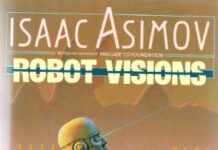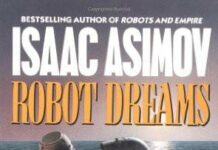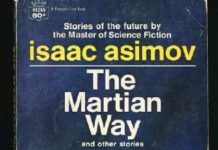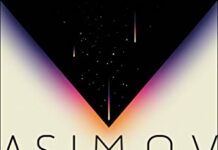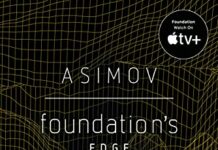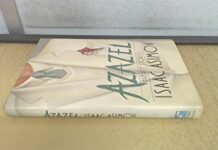
Ebook Info
- Published: 2021
- Number of pages: 390 pages
- Format: EPUB
- File Size: 0.28 MB
- Authors: Isaac Asimov
Description
A collection of twenty classic short stories by Isaac Asimov, author of the Foundation series, featuring the definitive version of “Nightfall”From one of history’s most influential writers of science fiction comes this collection of twenty short works of fiction, arranged in order of publication from 1941 to 1967. Compiled by Asimov himself, who prefaced each story with an introduction, it begins with “Nightfall,” the tale of a world with eternal sun that is suddenly plunged into total darkness and utter madness. “Nightfall,” published when the author was only twenty-one, was arguably his breakout work, making such an impression that, almost thirty years later, the Science Fiction Writers of America voted it the best science-fiction short story ever written.The other stories in the collection span far and wide: A dedicated scientist who whips up his own love potion. Machines that learn to think for themselves—and direct their thoughts to overturning the establishment. The discovery that Earthlings are being destroyed by a mysterious kind of psychological virus. A day when walking outdoors becomes a sign of psychosis. And many more.
User’s Reviews
Reviews from Amazon users which were colected at the time this book was published on the website:
⭐Nightfall and Other Stories is a collection of 20 pieces of short fiction by Isaac Asimov, including, of course, the novelette “Nightfall,” one of his most famous works. “Nightfall” was Asimov’s 32nd work but in many ways his first breakout work. The collection is curated by Asimov himself and includes an intro to each story by the author. The stories are arranged in order of publication, starting with “Nightfall” and stretching from 1941 to 1967.Believe it or not, I had never read any Asimov before picking up this collection. It seemed appropriate, though, to finally do so after reading Alec Nevala-Lee’s history of Astounding that name drops Asimov in the subtitle. Nevala-Lee speaks very highly of “Nightfall” in that book, so I decided that was a good place to start.Overall, I walked away impressed, if not surprised. The knock on Asimov, as I understand it, is his ability to write dialogue and characterization. It may be that he benefits from a shorter format, although I generally liked the longer pieces in this collection better than the shorter pieces. They are what you would want out of science fiction short fiction, emphasis on the science: idea-driven stories with at least enough plot to provide a skeleton for the story.Asimov wrote the introduction to each story himself. He writes with a charming, casual voice, and I can see why his nonfiction was so popular. There is an Asimov quote on his Wikipedia page—“There is a perennial question among readers as to whether the views contained in a story reflect the views of the author. The answer is, ‘Not necessarily—’ And yet one ought to add another short phrase ‘—but usually.’” That quote is from the introduction in this collection to “In a Good Cause—”. The introductions are fascinating, but more than once they hurt my enjoyment of the story, as you will see below.NightfallHow would man react if the stars only appeared once in several thousand years? Hard science fiction man that he is, Asimov provides a rather elaborate explanation: a planet in a system with multiple suns. The stars only appear when only one sun is in the sky and there is a solar eclipse (cause by a moon that is otherwise not visible). The entire story takes place in an observatory, with the only non-scientist characters a journalist and a cultist who intrude. In a world where it is never dark, darkness is tied indelibly to claustrophobia (you would think that man would have realized the benefits of sleeping in the dark shortly after realizing the benefits of four walls and a roof). It is taken for granted that darkness will drive men mad; the stars themselves are known, but only as a word, a myth. The story leaves us hanging, but it works for short fiction. This one is as good as advertised and probably the best story of the bunch.Green PatchesNot that Asimov doesn’t serve up another excellent story second. Humans depart a distant planet under strict quarantine conditions—the life on that planet could assimilate all life on Earth in a short time if it managed to hitch a ride. I’m not sure if Asimov invented it, but this trope has been used fruitfully in science fiction ever since. The end is a bit of a deus ex machina, but it works.Hostess“Hostess” is another very good story with a great premise, but it is also the first story in the collection that doesn’t age well. Not because of the technology but because of the gender roles. The 1950s of upper middle class white people was more anomalous than we give it credit for. Still, how often do you see a story built around hosting an alien for dinner and playing it entirely straight?Breeds There A Man . . . ?A classic post-atom bomb story with another very good science fiction premise. It’s a good story, but it doesn’t quite live up to the first three. The quality is going to get a lot more uneven from here on out.C-Chute“C-Chute” is the first story to suffer from its introduction. Asimov references the Korean War in a way that shows he was under the misapprehension that the Cold War wasn’t a fight against “an absolute evil . . . quite beyond the usual defame-the-enemy routine.” History would be pretty clear on the Soviet Union, Maoist China, and North Korea, but even 1951 Asimov should have known better. Human passengers on a merchantman are captured by the aliens against whom humans are locked in a bitter war. Maybe I wouldn’t have minded a character droning on and on about how morally superior the aliens were but for the introduction, although I suspect he would have been annoying regardless. The plot is muddled, but the elements for a great story are there, and it has a killer last line.In a Good Cause—An ambitious story that can’t quite meet its ambitions.What If—The usual knock on Asimov is that he can’t write good characters or human interaction, but “What If—” is an excellent little SF romance.SallyA nice little science fiction story, but the impressive thing is that Asimov, writing in 1953, not only predicts self-driving cars and Uber, but gets the timing pretty much right as well.FliesA lame story about a college reunion.Nobody Here But—“Nobody Here But—” is a story that suffers for the intro, which naturally encourages the reader to bring the author into things. Asimov, whose first marriage ended in divorce and who was infamous for groping female fans at cons, has no business denigrating lugs and galoots as being “particularly impervious to even sub-human understanding of feminine psychology.” Asimov claims in his intro to “What If—” that it’s the only straight-up romance that he wrote, but “Nobody Here But—” qualifies as well. He may have discounted it because of the humor, and it does have a heck of a punchline.It’s Such a Beautiful DayA nifty little story about people who never go outside due to cheap and easy teleportation. There is a dig at newfangled psychotherapy that is maybe aimed at John W. Campbell in part.StrikebreakerThe inestimable Hugo Awards Book Club mentioned Asimov’s anti-labor union views to me. The introduction to “Strikebreaker” makes clear just what Asimov thinks of the inconveniences of a strike. A story that would otherwise be a neat hypothetical showing the limitations of utilitarian thinking is sullied by the sense that Asimov’s sympathies are firmly with the utilitarians.Insert Knob A in Hole BFlash fiction that is disappointingly not about hot robot on robot sex.The Up-to-Date SorcererA bad story and a bad attempt at humor. Maybe I would have appreciated it more if I was more familiar with the story Asimov is riffing on, but I doubt it.Unto the Fourth GenerationA harmless story that didn’t work for me.What Is This Thing Called Love?This satire, on the other hand, is quite effective. It gets a whole lot of mileage out of the premise “aliens who don’t know what gender is try to figure out sex.”The Machine That Won the WarI’m still not sure whether this story is too clever by half or just clever enough.My Son, the PhysicistThe way Asimov uses gender roles grates, but this story is notable for two reasons: communication via text message and instant messenger happen just as Asimov describes in the story (albeit in a different context), and the story was originally run as an advertisement. I wish more marketing departments blew their ad budget commissioning short fiction.Eyes Do More Than SeePosits a long-, long-term future for humanity that, again, Asimov may or may not have invented, but that science fiction has fruitfully mined ever since.SegregationistThe intro here is perhaps my favorite in the collection because of Asimov’s rationale for writing the story: it was easier to write it than to write a letter declining the request to submit a story. Metaphors for racism would get beaten into the dirt by 90s fantasy, but as Asimov was writing in 1967 the story the approach was fresh, and political in the best way. It continues to hold a compelling science fiction angle beyond mere allegory, although the central conceit is ironic given where medical devices stand today.
⭐Nightfall is perhaps my favorite SF parable of all time. It’s short, but deep. There are lots of other classic Asimov tales in this volume, each with an introduction by the author, whose sense of humor is delightful.
⭐By telling a background for each story, he helps you understand the origin and sets of in timeYou can see technology advancing in th stories
⭐I first read these stories while riding to and from work on the Chicago Aurora and Elgin Railroad in the early 1950’s. I have been an Isaac Asimov fan ever since. I have read many of his science fiction short stories and novels as well as a lot of his non-fiction books and essays on the sciences. Regarding the sciences, he had the ability to explain complicated concepts in simple, every day, terms. Some of his science fiction has become fact and the world is running to catch up to his plausible scientific ideas. ADDENDUM: Having just read some other reviews, I realize that I failed to mention the most important feature of this particular publication. Some years after having written these short stories, Mr. Asimov added a backstory to each one of them. The backstories enhance the pleasure that I got out of reading this book. One of them made me look up King Lear, Act IV, Scene i, Lines 36-37!
⭐Somehow I lived all these years without having read Nightfall. What a great story! No wonder it’s famous.
⭐I love Asimov’s writing and these are some of his best short stories. The introductions before each story by the author give insight into his thinking. My big minus is the lack of any headlines or even a bold font to help you find the next story.
⭐I had this book back when I was a kid. 10 years old or so. It was from the Doubleday Book Club. (Wow, I’m aging myself.) I loved it then and started hunting it down about 10 years ago. Finally found a copy.”Nightfall” was expanded into a full-length novel. It shouldn’t have been. The short-story is perfect. Add to that Asimov’s other favorites and you’ve got a delightful look at a potential universe.Some of the stories show their age more than others, specifically those taking place on Earth. But even those are still worth reading and contemplating for awhile.
⭐Asimov wrote many books but this was the first sci-fi and you’ve gotta see how it all began. He got better as time went on but he was married to a psychoanalyst and the two of them wrote fascinating books about “robots”.
⭐What a disappointment, and what an insult to the genius and memory of one of the greatest ever Sci-Fi authors. Not the content but this 2021 edition, it is cheap and nasty. Random House/DelRey should be ashamed for thinking this is acceptable. If it weren’t for the content, which is of course awesome, I would hang this edition in the toilet and use it for the unmentionable. The cover is not much better than 80gsm paper, and I’d be surprised if the pages are even 60gsm. For £12.99 I expected a reasonable quality edition, instead I get toilet paper. This is being returned, and I shall look elsewhere for a better-quality edition.
⭐Now I know why Isaac Asimov is regarded as one of the premier science fiction writers of all time. These short stories are just exceptional, and each one comes with its own preface where Asimov gives a little insight into his writing, his inspiration, and original publication.
⭐Très bien
⭐Not found.
Keywords
Free Download Nightfall and Other Stories in EPUB format
Nightfall and Other Stories EPUB Free Download
Download Nightfall and Other Stories 2021 EPUB Free
Nightfall and Other Stories 2021 EPUB Free Download
Download Nightfall and Other Stories EPUB
Free Download Ebook Nightfall and Other Stories
